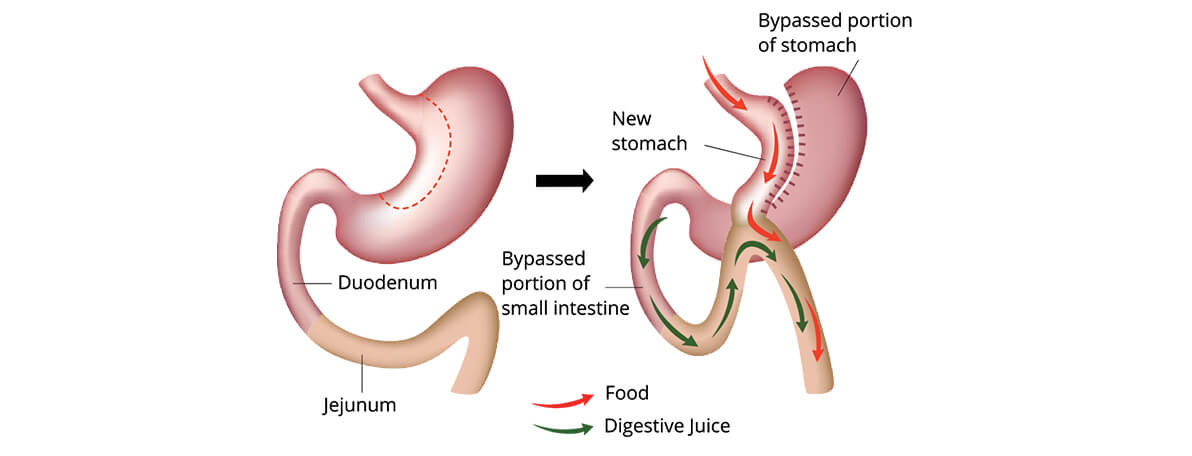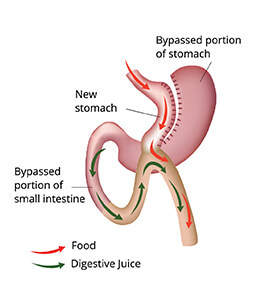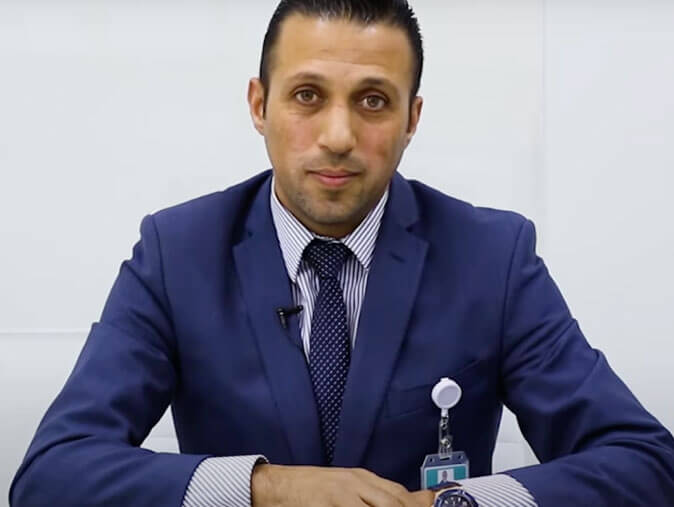What is a Mini Gastric Bypass?
The Mini Gastric Bypass (MGB) is a type of weight loss surgery that combines principles of both restriction and malabsorption. This procedure involves creating a smaller stomach pouch and bypassing a portion of the small intestine. The goal is to restrict food intake and reduce the absorption of calories, making weight loss more achievable when diet and exercise have not provided satisfactory results.
In Mini Gastric Bypass (MGB), the surgeon constructs a long, narrow tube from the upper stomach, creating a small pouch. The remaining stomach is not removed, unlike other types of bariatric surgeries. The small intestine is then connected to this new stomach pouch, bypassing the rest of the stomach and the first part of the small intestine. This structure allows fewer calories to be absorbed, which assists in weight loss.
The Mini Gastric Bypass procedure has many benefits. It's a simpler operation with a shorter operating time compared to other bariatric procedures. This surgery also often leads to significant long-term weight loss, favorable changes in gut hormones reducing hunger and improving satiety, and can help resolve many obesity-related health conditions.


How It Works
The mini-gastric bypass is performed by keyhole surgery under general anesthesia. Our surgeon will make three small incisions (about 5mm-12mm long) in your abdomen. Using special laparoscopic (keyhole surgery) instruments, he will staple the top of the stomach so that part of it forms into a thin tube (30ml to 50ml in size). The thin tube becomes the new stomach and is isolated from the rest of the stomach.
This new stomach is then attached to a loop of the small intestine. In this way approximately 150–200cm of the bowel is bypassed. The bypassed intestine and the rest of the stomach stay in the body, but they are no longer used for food digestion. This will reduce overall absorption by 20-30%.
Who Qualifies for a Mini Gastric Bypass?
To be eligible for a Mini Gastric Bypass, there are several qualifications that potential patients need to meet:
-
Severe Obesity: The classification for severe obesity is a Body Mass Index (BMI) of 40 or higher. Alternatively, if you have a BMI of 35 or above, along with at least one obesity-related health condition, you might also qualify.
-
Past Weight Loss Efforts: Before considering an MGB, it's crucial to have tried traditional weight loss methods, like diet and exercise, with failed outcomes. This surgery is not a first-line solution; it's considered when other attempts have been ineffective.
-
Psychological Readiness: An extensive evaluation will be done to assess your physical and mental readiness. This includes consultations with nutritionists, psychologists, and other medical professionals to determine your preparedness for the surgery and post-operative lifestyle changes.
Each patient's case is unique, and so it's crucial to have a thorough discussion with your healthcare professionals to see if the Mini Gastric Bypass is the right procedure for you.
Benefits of Mini Gastric Bypass
Weight Management
The Mini Gastric Bypass (MGB) surgery assists in weight management by reducing the size of the stomach, which in turn limits food intake. With a smaller stomach, you'll find that you can still enjoy a variety of foods, albeit in smaller quantities.
Additionally, this procedure alters the path of digestion, resulting in less caloric absorption. This dual action approach leads to significant and sustainable weight loss.
Mitigating Obesity-Related Health Problems
Excessive weight is often accompanied by a variety of health complications such as high blood pressure, sleep apnea, type 2 diabetes, and joint pain. Through the consistent weight loss brought about by MGB, many of these conditions can be alleviated.
Reducing weight not only helps mitigate these health risks but also decreases the dependence on medication, fostering a healthier and more active lifestyle.
Boosting Quality of Life
MGB is not just about losing weight. It's about giving you the chance to enjoy life to the fullest. Weight loss can lead to increased mobility, higher energy levels, and better physical well-being.
Individuals who undergo MGB often report a significant boost in their self-esteem, confidence, and overall mental health. It's a transformation that goes beyond the physical, impacting every aspect of daily life.
Compared to other bariatric surgeries, MGB presents a less complex and quicker option. The procedure involves minimal rerouting of the intestines, decreasing the chances of complications related to extensive intestinal bypass.
Comparative Safety of MGB
MGB is also a laparoscopic procedure, meaning it's less invasive, has a quicker recovery time, and lower risk compared to more invasive surgeries.
Procedure Breakdown
- The MGB surgery is performed under general anesthesia, typically taking between one to two hours.
- The surgeon begins by making small incisions in the abdomen to introduce the laparoscope and surgical instruments.
- The upper part of the stomach is then transformed into a small pouch, which effectively reduces its capacity to hold food.
- Following this, the small intestine is bypassed and connected to the new stomach pouch. This bypass reduces the amount of calories and nutrients the body absorbs.
- Once the adjustments have been made, the surgical incisions are closed with sutures and the patient is ready for recovery.
- The MGB is a comprehensive weight management solution that focuses not just on weight loss, but on an overall healthier lifestyle. By targeting both consumption and absorption, this surgical procedure provides a unique, less invasive pathway to improved health.
Initial Preparations
The journey to a Mini Gastric Bypass starts way before the actual procedure. If you've cleared the medical examination and are seen as a good fit for the surgery, you're required to follow a two-week liquid diet. Specific guidelines will be handed to you for this.
The idea behind this diet is to facilitate the reduction of abdominal and liver fat, enhancing the safety during the operation. Furthermore, to avoid any unpleasant or risky effects, your stomach should be empty of food or drink during the surgery.
So abstaining from eating or drinking for a minimum of 12 hours prior to the surgery is necessary to ensure your stomach is completely empty during the procedure.
Post-Surgery Recovery
Hospital Stay and the Initial Recovery Phase
After a Mini Gastric Bypass, patients generally remain in the hospital for a couple of days for close monitoring and handling any potential post-surgery discomfort or complications.
This period involves thorough tracking of your vitals, pain management, administering essential medications, and observing the incision's healing process.
Food Intake Progression and Dietary Guidelines
The diet plan following a Mini Gastric Bypass is specifically designed to help the healing process and encourage weight loss. In the beginning, this comprises a liquid diet for about 1 to 2 weeks, gradually transitioning to pureed or soft foods, and ultimately, solid foods.
Detailed advice regarding portion sizes, nutrient intake, and maintaining a balanced diet will be provided to aid your weight loss journey and prevent complications while your stomach recovers. Since your post-surgery meals will be smaller, thorough chewing is vital.
Also, due to the smaller meal sizes, you may need to supplement your diet with vitamins and minerals that could be challenging to obtain.
Physical Activity Guidelines
Recovery from a Mini Gastric Bypass doesn't only involve dietary changes but also includes a steady increase in physical activities. Starting with mild movements and progressively elevating activity levels as recovery proceeds is crucial.
This could involve walking, light aerobic workouts, and strength training exercises to help build muscle mass and kick start metabolism.
Mental Health Support
While the Mini Gastric Bypass primarily aims at improving physical health, it also has psychological and emotional implications. Providing emotional support is key in helping patients deal with post-surgery adjustments and challenges.
If patients are dealing with emotional concerns associated with food, body image, or self-esteem, counseling or therapy is highly recommended.
Risks and Important Considerations
Potential Complications and Side Effects
Mini Gastric Bypass (MGB) is generally a safe procedure, but like any surgery, it carries potential risks and complications. Some common issues that can arise after surgery include:
-
Bleeding and infection: Although rare, these are general surgical risks that should be monitored.
-
Deep vein thrombosis and pulmonary embolism: Blood clots can form in the legs and travel to the lungs, which requires attention.
-
Irregular heartbeat: This can occur but is usually manageable with medical attention.
-
Pneumonia: A risk associated with anesthesia and surgical procedures.
Specific risks related to MGB include
-
Gastric leaks: Occurs when stomach fluids leak from the suture line, which requires immediate medical attention.
-
Stenosis: A narrowing in the gastric sleeve that can cause obstruction in the stomach.
-
Vitamin deficiencies: The section of the stomach removed is partly responsible for vitamin absorption, leading to potential deficiencies.
-
Heartburn: Reshaping the stomach can cause or worsen heartburn, but it can often be treated with over-the-counter medication.
Irreversibility of MGB
It's crucial to understand that Mini Gastric Bypass is an irreversible procedure. Once the surgery is done, there is no going back to your previous stomach structure. Therefore, it's essential to thoroughly discuss your expectations and potential outcomes with your healthcare provider before deciding to undergo MGB.
Importance of Post-Operative Care
After MGB, post-operative care is vital for your well-being and success. Regular follow-up appointments are necessary to:
-
Monitor your progress: Tracking weight loss and overall health improvements.
-
Manage complications: Identifying and addressing any issues that may arise.
-
Adjust treatment plan if needed: Adapting the approach to suit your changing needs.
-
Receive guidance and support: Helping you navigate the post-surgery lifestyle changes.
Commitment to Lifestyle Changes
MGB is not a quick fix; it requires a long-term commitment to lifestyle changes. This includes:
-
Adopting healthier eating habits: Focusing on nutrient-rich foods and portion control.
-
Regular exercise: Incorporating physical activity into your daily routine.
-
Behavioral changes: Addressing food choices and eating patterns.
-
These lifestyle adjustments are necessary for maintaining weight loss and overall well-being after the procedure. Remember, returning to old habits can lead to weight regain.
Excess Skin Concerns
Losing a significant amount of weight in a short period often results in excess skin. While this can be addressed with surgery if it affects your comfort or confidence, it's best to wait for your body to stabilize, which may take up to 18 months after the procedure.
Nutritional Considerations and Supplementation
Since MGB can affect nutrient absorption, monitoring your nutritional status is essential. Deficiencies in vitamin B12, iron, calcium, and vitamin D are possible, so regular follow-ups and appropriate supplementation are crucial to prevent any complications.
Mini Gastric Bypass can be an effective tool for weight loss, but it's vital to be aware of the potential risks and considerations. By committing to post-operative care, lifestyle changes, and proper nutrition, you can maximize the benefits of this procedure and achieve long-term success in your weight loss journey.
Always consult with a qualified healthcare provider to discuss your individual situation and determine if MGB is the right option for you.
Frequently Asked Questions
-
What is a Mini Gastric Bypass (MGB)?
Mini Gastric Bypass is a weight loss surgery that creates a small stomach pouch and bypasses a part of the small intestine to reduce food intake and absorption.
-
How does MGB help you lose weight?
MGB limits the amount of food you can eat and makes it harder for your body to absorb nutrients. This makes you lose weight.
-
Is MGB a safe procedure?
MGB is usually safe when done by an experienced surgeon at a reliable clinic, but as with any surgeries, it has some risks.
-
How long does this kind of gastric surgery take?
Most MGB surgeries take between 1 and 2 hours.
-
What is the time it takes to get better after MGB?
Recovery from MGB usually takes between 2 and 4 weeks, but patients can gradually get back to their normal lives.
-
Can it be undone?
MGB is generally thought of as final and irreversible, but it can be changed or undone in some situations.
-
What are the potential risks and complications of MGB?
Potential risks include infection, bleeding, blood clots, and vitamin deficiencies. Long-term complications may include ulcers or bowel obstructions.
-
How much weight can I expect to lose with MGB?
Weight loss varies, but patients often lose 60-70% of their excess weight within 1 to 2 years after the surgery.
-
Will I need to make lifestyle changes after MGB?
Yes, adopting a healthy diet and regular exercise routine is crucial for successful and sustained weight loss after MGB.
-
Who is a suitable candidate for MGB?
Candidates who have a body mass index (BMI) above 40 or a BMI above 35 with obesity-related health issues and have tried other weight loss methods without significant success.
BOOK Now
Make An Appointment
-

80026763
Contact Dr. Samir if you have any questions
-

Visit
02 Jumeirah Beach Rd - opposite Burj Al Arab - Umm Suqeim - Jumeirah 3 - Dubai
Opening Hours:
9am-9pm (Saturday- Thursday)
9am-6pm (Saturday)






